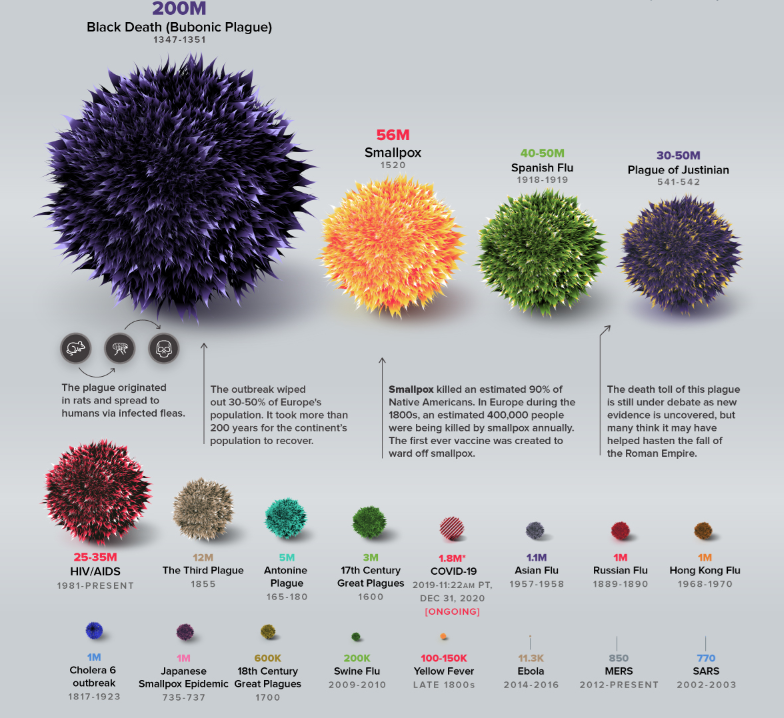Pandemics: Past, Present and How They Can Help For the Future
This shows the way that past pandemics have looked and their death tolls.
Throughout the history of Earth, there have been many things that have repeatedly happen and one of these happens to be pandemics. Some of the most well-known and talked about viruses are those that had major effects because of their statuses as pandemics. One of these is known as ‘The Black Death’ and many types of Influenza have earned the title of a pandemic.
A pandemic is a single disease that is prevalent across the entire world while an epidemic, which is where most of them start, is defined as a widespread occurrence of an infectious disease in a community over a particular amount of time. These often hold high death tolls leading to massive issues in every group that it does affect. This has led to famines and caused viruses to spread even faster because of the living conditions and being surrounded by dead or dying bodies.
Viruses often originate from animals, most commonly noted are bats, rats, and birds, which can make it harder to prepare for without doing in depth research into every virus found in the wild populations and how they may affect the human population.
Throughout the history of pandemics, there have been many different attempts at ways to fight them. Some of the most known and talked about methods are things like the plague masks that were shaped like bird heads and the beaks were filled with fresh or nice smelling herbs and flowers as it was believed that disease was caused by foul smells. This was most likely supported by the disgusting living conditions and the fact that dead bodies that upped the rate of spread smelled horrible.
Some of the newer methods of fighting viruses are vaccines, which were developed in the late 1700s by a man of the name Edward Jenner. One type of vaccine is those which have a dead version of the virus which then CD8+ T cells should learn how to defeat if the live virus happens to get into the body. These are types of vaccinations like the Influenza and Rabies vaccine. Another type is mRNA, which is one of the ways the world has started to vaccinate for COVID 19. “mRNA vaccines make proteins in order to trigger an immune response. According to Vaccines.Gov, mRNA vaccines have several benefits compared to other types of vaccines, including shorter manufacturing times and, because they do not contain a live virus, no risk of causing disease in the person getting vaccinated.”
One of the most recent pandemics from before the 2000s was Influenza. This pandemic happened around 1918 and was known by many names mainly based on where it was suspected to come from. After this, much research time was spent on the many different strains of influenza even after a vaccine was developed. This led to much of the world being unprepared for COVID because of the lack of diversity in research. In many ways, this could have led to a faster idea of how to help and combat COVID. Even if they would have added more scope to their research they still could not have known exactly how to defeat the virus before it had become prevalent.
There are many ways the world as a whole can start preparing for the next pandemic. Some of these would be broadening research fields and testing different ways to create vaccines before any new methods are needed. Before COVID, most of the time researching was put towards different strains of the Flu as that has been some of the most prevalent pandemics through history. But there are many other types of viruses that have devastated humanity through the years and expanding what being researched could make it so that when the next virus hits it may not have to be called a pandemic because everything is already prepared to get the strain under control.
There are also many ways that as a society people can help with combating present and future pandemics. Some of these are as simple as staying home when feeling ill or simply wearing a mask to be conscious of those that are immunocompromised. Many people have said that they should not be the ones to be forced to wear a mask because of how others’ bodies work or that those that could die from the virus should just stay home. The thing with this is that even through the periods of total lockdown, these were the same people that were complaining about being stuck in the same place every day.
There are other things that people can do to combat any future viruses. These could be donating money or blood to local hospitals and research centers to help prepare for any crises that could occur. Throughout COVID, many of the problems that arose were the lack of money because of the high prices of the equipment that was needed to save lives. Through this, many creatives all over the world pioneered ways to create more price effective and accessible ways to create health equipment.
Through these ways, it will be able to make the necessary equipment more affordable for healthcare workers and patients alike. This could also help in cutting down the death totals as hospitals will not have to pick and choose who lives and who dies. This could most likely be done for other health equipment to make it easier to test for disease to help catch anything before it starts to spread.
As a society, with the new knowledge that has been learned through this pandemic and past ones overall, the world should be more prepared for future outbreaks and new diseases. In the ways of staying home when sick or simply wearing a mask, the world can set itself up for success for the next time. A way for the world to get through future outbreaks is to listen to health officials and do as much as possible to thank the health care workers that have done so much this past year.







